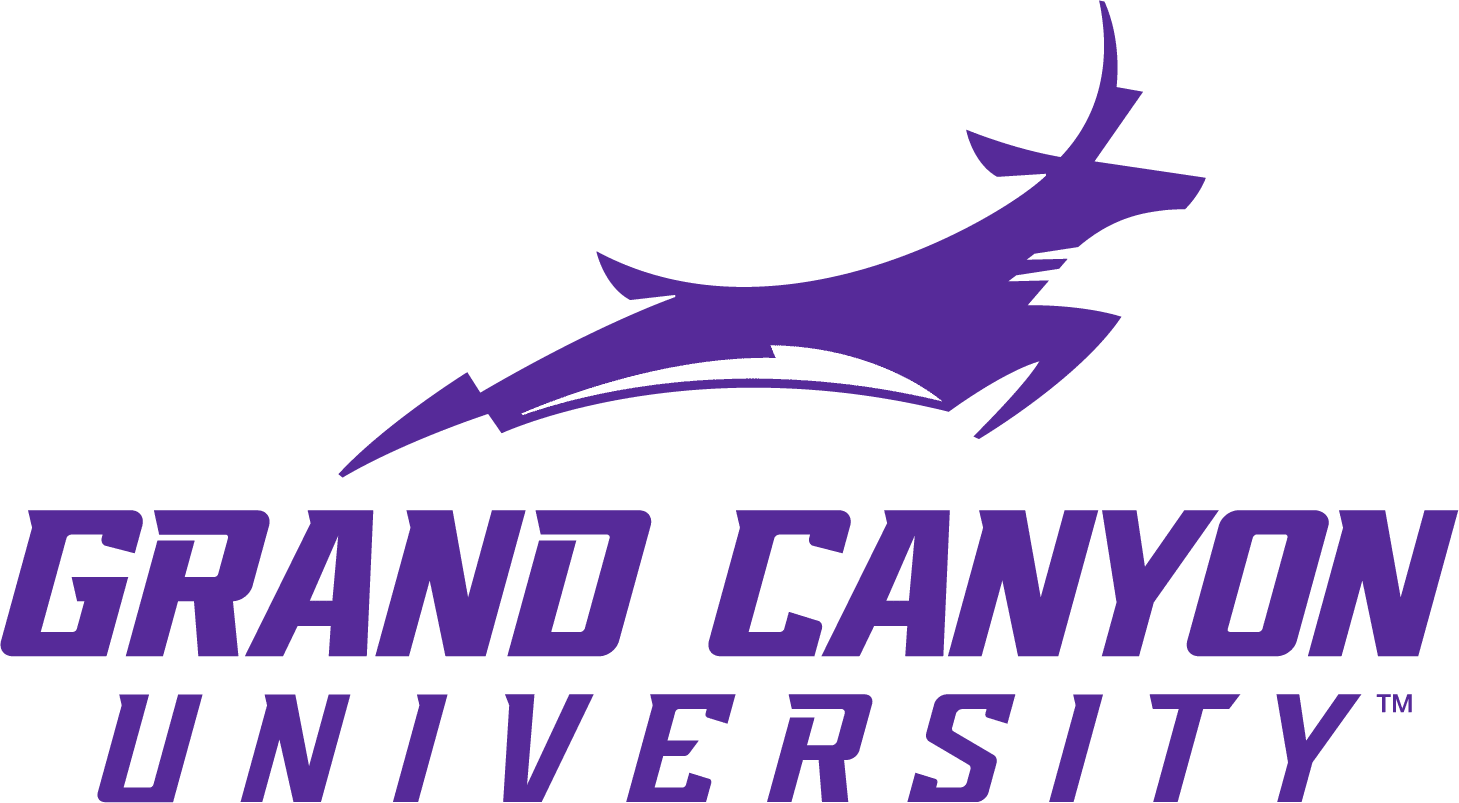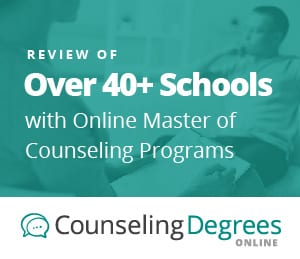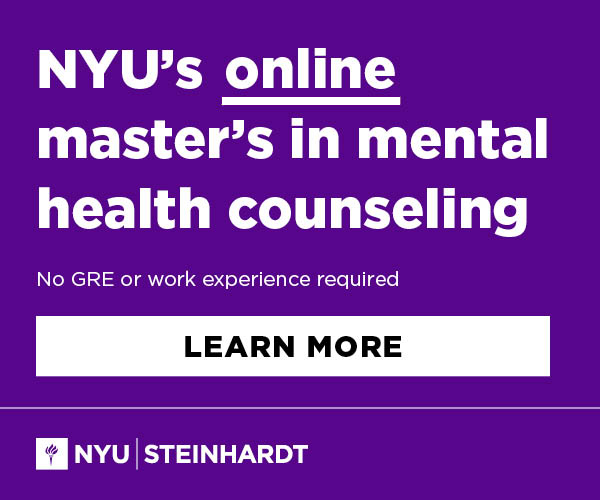 Northwestern University : Online MA in Counseling (CACREP Accredited)
Northwestern University : Online MA in Counseling (CACREP Accredited) Northwestern University : Master of Science in Marriage and Family Therapy (Complete your COAMFTE-accredited MFT online program in as few as 21 months. No GRE required.)
Northwestern University : Master of Science in Marriage and Family Therapy (Complete your COAMFTE-accredited MFT online program in as few as 21 months. No GRE required.) Walden University : MS in School Counseling (CACREP Accredited)
Walden University : MS in School Counseling (CACREP Accredited) Walden University : MS in Clinical Mental Health Counseling (CACREP Accredited, six specializations to choose from)
Walden University : MS in Clinical Mental Health Counseling (CACREP Accredited, six specializations to choose from) Grand Canyon University : Master's Degree in Counseling (As a private university, GCU has the same in-state and out-of-state tuition.)
Grand Canyon University : Master's Degree in Counseling (As a private university, GCU has the same in-state and out-of-state tuition.) Liberty University : MA: Clinical Mental Health Counseling (CACREP Accredited) (Online with required intensives)
Liberty University : MA: Clinical Mental Health Counseling (CACREP Accredited) (Online with required intensives) Mid-America Christian University (MACU) : Master of Science (MS) in Counseling (100% Online, No GRE Required)
Mid-America Christian University (MACU) : Master of Science (MS) in Counseling (100% Online, No GRE Required) Southern New Hampshire University (SNHU) : Online Psychology Degrees (Bachelors and Masters. Flexible. Affordable. And achievable.)
Southern New Hampshire University (SNHU) : Online Psychology Degrees (Bachelors and Masters. Flexible. Affordable. And achievable.) The Chicago School : M.A. in Clinical Mental Health Counseling (Online Programs. CACREP Accredited.)
The Chicago School : M.A. in Clinical Mental Health Counseling (Online Programs. CACREP Accredited.)Steps to Becoming a Counselor
1. Earn a Bachelor’s Degree in Counseling or Psychology
The first step required to become a counselor is graduating from an accredited bachelor’s degree program. Most students on the path to professional counseling enroll in a Bachelor of Counseling or Bachelor of Psychology program, since both contain the necessary foundational knowledge for a career in this area. Bachelor’s degree options typically take around 4 years to complete and can be enrolled in traditionally or online.
Once the initial undergraduate degree program has been completed, upcoming professionals should then locate a Master’s in Counseling that has received proper accreditation. The Council for Accreditation of Counseling and Related Educational Programs (CACREP) is the agency of choice for accreditation of these programs, with most states requiring this type of accreditation for licensure.
View Online CACREP accredited counseling programs
2. Identify Key Specializations and Areas of Interest
Before moving forward to your graduate studies, it's key that you consider what type of counselor you'd like to be in your career.
There are many specialization options for counselors, including:
- Marriage and family counseling
- School counseling
- Grief counseling
- Addiction counseling
- Career guidance counseling
If you're not sure what type of counseling specialization is the right fit for you, you have options. You can choose to enroll in a general counseling graduate program and choose a specialization down the line (or you can practice as a general therapist). You can also reach out to local counselors and ask if they'd be willing to sit down with you and describe their specialization, allowing you to gain insight into whether their counseling niche may be the right fit for you.
3. Pursue a Master’s Degree in Counseling
Master’s in Counseling programs can take around 2 years to complete on average, with some programs offering shorter or longer completion estimates depending on your needs. Master’s programs can also offer specialization options to help create the best training for you during your learning experience.
Some students may find it beneficial to consider even higher level college programs for their career. Doctoral degrees in Counseling are not required for entry into careers, but can be a good way for you to gain more knowledge and expertise about counseling as a tool for client success.
4. Complete Practicum or Internship Hours
The clinical experience requirement for most states lasts around 2 years, during which you can work with clients under the supervision of a licensed and approved supervisor. Some schools can assist you with locating a facility to engage in this experience, while others may assign you with the task for setting up a supervisor and clinical location. This experience can also provide you with additional insight into what counseling specialization might be the right fit for your interests.
5. Earn a Counseling Licensure or Certification
Requirements for state licensure depend on your location, and it's important to be aware of what you'll need to do in order to practice as a therapist. Part of this requirement involves a licensing examination, which will test your skills and abilities in your field. You may take this test as a part of your master's degree program, or you may need to wait until your clinical experience hours are complete in order to test and gain your license to practice as a counselor.
If you're considering moving to another state or would like to be certified in more than one state for other reasons (such as practicing online), be sure to stay informed of licensing requirements so that you can begin practicing independently as soon as possible.
🗪 Consider: The Counseling Licensure Guide is a good start to understanding different licensure options for professional counselors.
6. Fulfill Any Remaining State Requirements
Sometimes, requirements for counselors change according to new research and regulations. It's important that you stay informed of changes in your state so that you're able to maintain your license. Joining a professional organization for counselors can be helpful to make sure you're informed of changes in the field that could affect your license.
7. Advance Your Knowledge and Expertise Through a Doctorate and/or Continual Learning
If you choose to move into a doctoral-level program, you should validate that your program has received accreditation from the American Psychological Association (APA). This agency has long been the most reliable resource for students interested in majors related to psychology and counseling.
Counseling can be a very influential service to its clients. In order to obtain your license, you may be required to engage in a clinical experience requirement that helps you learn from licensed professionals in your field.
As an added measure for ensuring your validity and expertise as a counseling professional, states also require that you take part in continuing education during your licensure. Most counselors attend conferences or take classes each year as a means for meeting this requirement within their state. Regular documentation and certificates of completion should be turned in to your licensing agency to fulfill this requirement.
Consider a Featured Online Counseling Program
| School and Program Information | Online Program? Entry Requirements |
Course Information |
|---|---|---|
| Northwestern University
Online MA in Counseling
 CACREP Accredited CACREP Accredited |
✔ Online
GRE Not Required Bachelor's Required |
Prepare to pursue licensure in as few as 18 months Learn MoreFull-time, part-time, and accelerated track options available |
| Northwestern University
Master of Science in Marriage and Family Therapy
COAMFTE Accredited |
✔ Online
GRE Not Required Bachelor's Required |
The COAMFTE-accredited MFT@Northwestern is offered by The Family Institute at Northwestern University. Full-time students can complete the program in as few as 21 months. No GRE is required, but applicants must hold an undergraduate degree. Full and part-time tracks available. Learn More |
| Walden University
MS in School Counseling
 CACREP Accredited CACREP Accredited |
✔ Online
GRE scores not required |
School counselors help students overcome obstacles and shape successful futures. Walden’s online MS in School Counseling program will give you a solid foundation in school counseling theories, approaches, and best practices while enabling you to gain hands-on experience. Learn More |
| Walden University
MS in Clinical Mental Health Counseling
 CACREP Accredited CACREP Accredited |
✔ Online
GRE scores not required |
Mental health counselors play a valuable role in helping people cope with life’s challenges. Walden’s online MS in Clinical Mental Health Counseling program can help you become the competent, compassionate counselor you know you can be. Learn More |
| Grand Canyon University
Master's Degree in Counseling
HLC and NASAC Accredited |
✔ Online
|
Clinical Mental Health Counseling master's degree emphases include: Childhood and Adolescence Disorders, Christian Counseling, Marriage and Family Therapy, and Trauma. Designed to meet the academic requirements of the National Board for Certified Counselors for the National Certified Counselor credential, the Certified Clinical Mental Health Counselor credential and the Arizona Board of Behavioral Health Examiners. As a private university, GCU has the same in-state and out-of-state tuition. Learn More |
| Liberty University
MA: Clinical Mental Health Counseling (CACREP Accredited)
 CACREP Accredited CACREP Accredited |
✔ Online
Online with required intensives |
Our CACREP-accredited master’s in counseling degree online can help you become an ethical, well-trained mental health counselor with the knowledge, values, and skills you need to empower others to make positive changes in their lives. Online and on campus. Training Champions for Christ since 1971. Learn More |
| Mid-America Christian University (MACU)
Master of Science (MS) in Counseling
Higher Learning Commission (HLC) |
✔ Online
100% Online |
Expand your impact with an online counseling degree rooted in faith-based practice. Mid-America Christian University offers the largest Master of Science (MS) in Counseling program in Oklahoma, with emphasis areas in addiction and substance abuse, applied behavioral science, clinical mental health counseling, and marriage and family therapy. Explore the online MS in Counseling at MACU. Learn More |
| Southern New Hampshire University (SNHU)
Online Psychology Degrees
Bachelors and Masters NECHE Accredited |
✔ Online
No application fee or GRE/GMAT scores required |
With our unique programs - from child and adolescent development to forensic psychology - you'll be prepared for a wide variety of careers in case management, research, human resources, youth services and social services. Learn More |
| The Chicago School
M.A. in Clinical Mental Health Counseling
 CACREP Accredited CACREP Accredited |
✔ Online
Bachelor's Degree Required. |
This online CMHC program prepares students for a career offering mental health services in a variety of settings; helping diverse clients through issues such as depression, anxiety, grief, low self-esteem, stress, relationship difficulties, and suicidal impulses. Learn More |
*Sponsored Counseling Programs
Online CACREP Accredited programs | Online MPCAC Accredited programs
Get Your Counseling Questions Answered: How Long Does It Take to Become a Counselor?"
What Do Counselors Do?
Counselors work to help people develop coping skills, deal with difficult situations, work through trauma, and more. Some counselors work with children while others work with adults. Many counselors have a specialization (such as addiction counseling), while others are open to working with all clients.
While many counselors work with clients in individual sessions, others conduct family and group therapy sessions where they work to facilitate conversation and understanding. In addition to practicing, some counselors also work in research, contributing to the advancement of best practices in the field.
What's the Difference Between a Counselor and a Psychiatrist?
A counselor works to help people develop coping strategies and skills that can support their mental health. A psychiatrist does some counseling, but also is a medical doctor who is licensed to prescribe medication for mental health disorders.
Education Requirements for Counselors
The state you live in may have specific requirements for you to abide by in order to become licensed as a counselor.
The minimum degree requirement for licensed counselors in the U.S. is a master's degree, which should have a major in counseling or a specific counseling-related field. Some colleges offer specialized programs such as Clinical Mental Health Counseling or School Counseling, which would be excellent options for students intrigued by counseling within certain settings.
Some doctoral level programs may also be useful for upcoming master's degree holders, which could provide access to specialized areas such as Counselor Education and Supervision. Depending on what role you would like to obtain as a professional in this field, master's or doctoral degree programs could be what you need to get the job you dream about.
How Long Does it Take to Become a Counselor?
Before you ever consider enrollment into a Master's in Counseling program, you should have completed an undergraduate degree program in counseling, psychology, or other related field. The bachelors program consists of topics that act as a foundation for future degree programs and can take around 4 years for students to complete.
The next step on your path is a master's program. Master's degrees can take anywhere from 1-3 years to complete for most students, depending on the institution attended, the rate of classes taken, and a student's enrollment status. Choosing the quickest route can have you finishing your educational requirements within 5-6 years.
Types of Counseling Licensure
- Counseling Licensure Guide--Learn about the different types of online counseling programs available in the United States.
- State Counseling Licensure--Find your state to learn more about the requirements for a counseling license.
- What It Takes to Become a Counselor--Find more information on the steps you'll need to take to become a professional counselor.
- LPC: Licensed Professional Counselor--Learn about the details required to become a licensed professional counselor.
- LFMT: Family and Marriage Therapist--Discover what it takes to earn your specialization as a licensed family and marriage therapist.
- LCSW: Licensed Clinical Social Worker--Get more information about how you can become a social worker, helping families and individuals develop the skills they need to thrive.
- LMHC: Licensed Mental Health Counselor--Learn how you can tailor your education toward becoming a licensed mental health counselor in your state.
- CCMHC: Certified Clinical Mental Health Counselor--Learn how this specialization can open up opportunities to work in the counseling specialty of your choice.
- MAC: Master Addictions Counselor--Get more information on programs that can certify you to work in detox and rehab centers.
- BCBA: Board Certified Behavior Analyst--Learn how to earn your BCBA to help children living with behavioral issues.
- NCC: National Certified Counselor--Learn more about this national certification that can help launch your counseling career.
- NCSC: National Certified School Counselor--Discover programs that will allow you to begin counseling students.
- LCPC: Licensed Clinical Professional Counselor--Learn how this certification can set you up for success in private practice.
- LPCC: Licensed Professional Clinical Counselor--Get more information about how this advanced license can prepare you to support clients with emotional issues.
Clinical Experience for Becoming a LPC
Completing your educational requirements is not the final step towards becoming a Licensed Professional Counselor. Beginning in your graduate program, you may be expected to start your clinical experience requirement that is needed for licensing.
Note: Some schools can assist you with locating a placement for this experience, while others may leave it up to you to set up your experience with mental health agencies within your community.
Top Masters in Counseling Programs
- Masters in Counseling
- Online Masters in Counseling
- No GRE MA in Counseling
- Online Master of Arts in Counseling
- Schools with an Online Master of Counseling
- Accelerated MA in Counseling
- Hybrid MA in Counseling
- Dual Masters in Counseling Degrees
- By Online Counseling Program Specialization:
- Online Masters in Behavior Analysis
- Online Masters in Clinical Mental Health Counseling
- Online Masters in Counseling Psychology
- Online Masters in Mental Health Counseling
- Online Master of Rehabilitation Counseling
- Online Masters in School Counseling
- By Accreditation:
- Online CACREP Accredited Masters Programs
- Online MPCAC Accredited Programs
Since many counseling agencies allow master's students to practice under the supervision of a licensed counselor, this could be a great opportunity for you to gain experience and the agency to gain additional workers for their everyday demand.
The supervised experience requirement for most states is around 1,000 hours of direct experience under a licensed supervisor. While most of the work performed during this experience is with clients in the field, at least 100 hours must be completed with the supervisor present and observing. The entire experience requirement totals to 2 years for students engaging at the maximum rate.
 Northwestern University - Online MA in Counseling (CACREP Accredited)
Northwestern University - Online MA in Counseling (CACREP Accredited)
 Northwestern University - Master of Science in Marriage and Family Therapy (COAMFTE Accredited)
Northwestern University - Master of Science in Marriage and Family Therapy (COAMFTE Accredited)
 Walden University - MS in School Counseling (CACREP Accredited)
Walden University - MS in School Counseling (CACREP Accredited)
 Walden University - MS in Clinical Mental Health Counseling (CACREP Accredited)
Walden University - MS in Clinical Mental Health Counseling (CACREP Accredited)
 Grand Canyon University - Master's Degree in Counseling (NASAC Accredited)
Grand Canyon University - Master's Degree in Counseling (NASAC Accredited)
 Liberty University - MA: Clinical Mental Health Counseling (CACREP Accredited) (CACREP Accredited)
Liberty University - MA: Clinical Mental Health Counseling (CACREP Accredited) (CACREP Accredited)
 Mid-America Christian University (MACU) - Master of Science (MS) in Counseling (Higher Learning Commission (HLC) Accredited)
Mid-America Christian University (MACU) - Master of Science (MS) in Counseling (Higher Learning Commission (HLC) Accredited)
 Southern New Hampshire University (SNHU) - Online Psychology Degrees (NECHE Accredited)
Southern New Hampshire University (SNHU) - Online Psychology Degrees (NECHE Accredited)
 The Chicago School - M.A. in Clinical Mental Health Counseling (CACREP Accredited)
The Chicago School - M.A. in Clinical Mental Health Counseling (CACREP Accredited)
Different Types of Counselors
Counseling is a field that can be very beneficial for a wide range of people for different purposes. Receiving your degree in counseling can potentially open up doors into different sectors of the counseling field, such as in specific areas in education or mental health.
Online Counseling Programs
- Online Counseling Programs
- Online Master of Counseling
- Online Accelerated MA in Counseling
- Review of Online Master of Counseling Programs
- Online CACREP Accredited Programs
- Online MPCAC Accredited Programs
- 100% Online Counseling Programs
- Online MA in Counseling
- Online MA in Counseling with No GRE Requirement
- Online Master of Counseling Psychology
- Online Master of School Counseling
Most graduates interested in pursuing a specialized field in counseling will first receive their degree and then move into certification programs to learn more about practice in that area. There are many different popular options for you to review prior to making a final decision about which type of counseling would be the most fitting for you. Take a look at some common counseling options listed below.
- Mental Health Counselor
- School Counselor
- Substance Abuse Counselor
- Marriage and Family Counselor
- Grief Counselor
- Career Counselor
- Trauma and Crisis Counselor
Employment and Salary for Counselors
Licensed counselors can work in a tremendous variety of settings, including those focusing specifically on mental health. Counselors can work with individuals that are managing the symptoms of common mental health disorders like anxiety or depression, or even assist clients while they work through circumstances within their lives.
Counselors can also be found in schools, acting as mentors and guidance professionals for students. In this setting, counselors can work individually with different students on future planning and assist them with working through problems at school or home.
The setting for counseling professionals can be just as diverse as the earnings. Depending on the type of clients you work with and the organization you are employed with, you could see a wide range of earnings as you gain more experience in counseling. In the section below, you can view average salaries for professionals currently employed as counselors in different specialized areas.
Average Salary for Counselors
- Substance Abuse, Behavioral Disorder, and Mental Health Counselors: $44,360 on average per year (BLS).
- School and Career Counselors: $56,310 on average per year (BLS).
- Rehabilitation Counselors: $35,630 on average per year (BLS).
Skills Counselors Tend to Have
If you are interested in becoming a professional counselor, you should be aware of some of the skills that can set you on track for success in this field. Since counselors spend a lot of time talking to others about their lives and issues, upcoming professionals should begin with having great communication skills.
Other skills that can be beneficial for you to have are those that encourage research and insight, compassion, and positive social interaction. Providing counseling services to clients can be an extremely important tool that utilizes a broad range of skills from the provider.
Counseling Organizations to Know
Professional organizations in counseling can be a useful resource for new and existing counselors working with clients on a regular basis. Benefits to joining these organizations include access to new information and research in the field, communication with other licensed professionals, and provisions relating to job openings and conferences within your area.
The most popular professional organization for counselors is the American Counseling Association. This agency provides information for counselors in all fields, making a great general guide for you as you begin your new career.
Organizations focusing on specialized counseling fields are also available for you to consider, including the American Mental Health Counselors Association, the American Association for Marriage and Family Therapists, and the American School Counselor Association.
Still Looking For A Counseling Degree?
Here are some of the most popular online counseling programs. On each page you will find a detailed write-up of the program, specific courses, and schools that offer that program that are currently accepting applicants.
- Online Counseling Degrees
- Online Masters in Counseling
- Bachelors in Counseling
- Masters in Counseling
- Counseling Schools by State
- Counseling Career Guide
- Highest Paid Counseling Jobs










